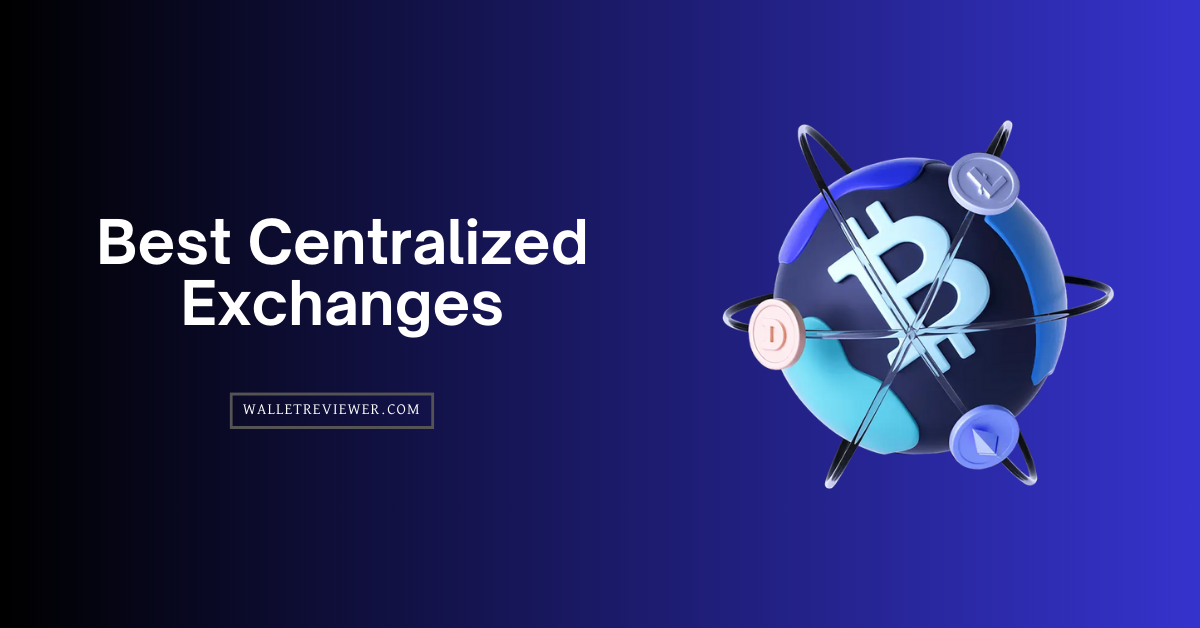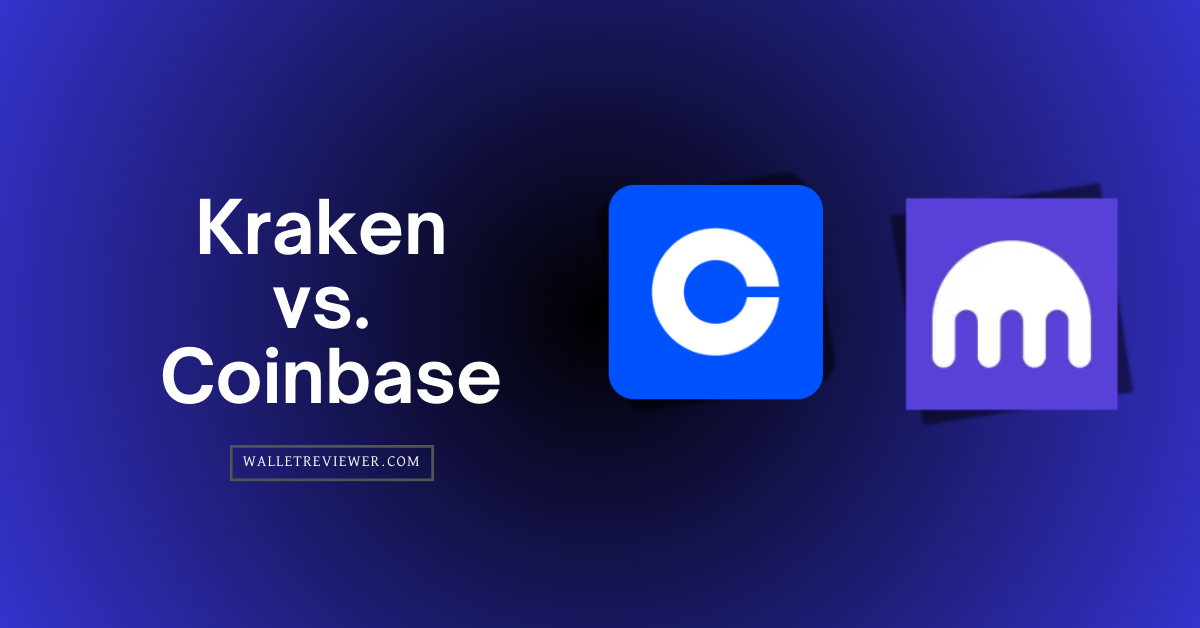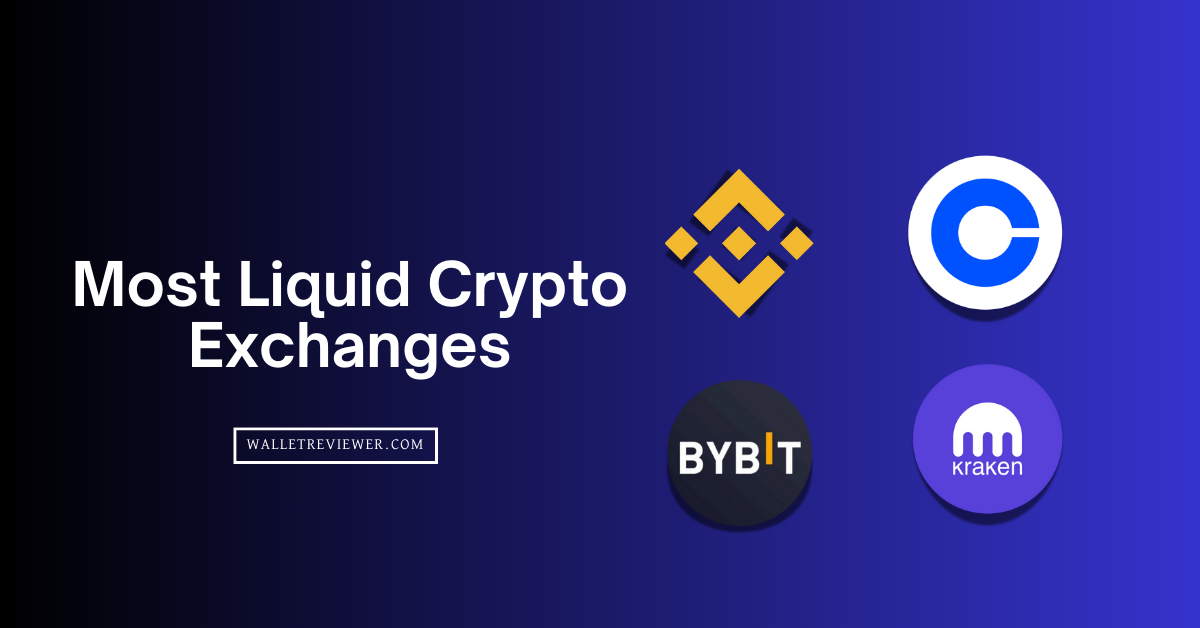You know, choosing the best centralized crypto exchanges is not easy with so many platforms claiming to be number one. As a trader, you need to look for low fees, strong security, and easy fiat access, but not every exchange delivers on all points.
Most of the top centralized crypto exchanges like Binance, Coinbase, Kraken, and Bitget stand out for reliability, while others like MEXC and KuCoin attract users with lower trading costs and more altcoin options. In this guide, you’ll learn how to compare the best CEX platforms and what makes certain platforms better for beginners, advanced traders, and long-term crypto investors.
List of Low-Fees Centralized Crypto Exchanges: Top 10 Platforms
We have reviewed over 30 top centralized exchanges based on supported cryptocurrencies, trading fees, security measures, licensing, and trading features. Here are our top 10 best centralized crypto exchanges to use right now:
- Bitget: Overall best centralized crypto exchange of 2025 (most trusted)
- MEXC: Best centralized exchange for no-KYC trading (full privacy)
- Kraken: Best centralized exchange in the US and Europe (FinCEN and MiCA registered)
- BingX: Safest centralized Bitcoin exchange for beginners (low fees and insurance fund)
- KuCoin: Best CEX for altcoins (Ethereum, Solana, XRP, and low-cap coins)
- Binance: Best CEX for high liquidity crypto trading ($100B+ daily trading volume)
- Bybit: Best CEX for derivatives trading (futures, options, and margin trading)
- Gate.io: Top CEX for leverage trading (125x perpetual futures contracts)
- Coinbase: Best centralized exchange in the USA (publicly listed company)
- HTX: Best CEX for buying Bitcoin instantly
Best Centralized Exchanges 2025 (In-depth Review)
Here is the in-depth review of the top centralized exchanges for crypto in 2025…
1. Bitget: Overall best centralized crypto exchange of 2025
| Our ranking | #1 |
| Regulated and Licensed | Yes (Poland, El Salvador, USA, and Lithuania) |
| Insurance | Yes ($600M protection fund) |
| Supported cryptocurrencies | 700+ coins |
| Trading fees | Spot: 0.1% maker/taker (20% off with BGB). Futures: 0.02% maker, 0.06% taker |
| Features | Copy trading, automated trading bots, spot and futures trading, |
| Maximum leverage | Up to 125x for futures contracts (varies by asset) |
| Trading volume and liquidity | Over $10 billion USDT (24-hour) |
| Payment methods | Credit/Debit card (Visa, Mastercard), Bank Transfer, Apple Pay |
| Minimum deposit | $1 USD |
| KYC Required | Yes (Mandatory) |
| Withdrawal limits | $6 million for regular users (increases with KYC levels) |
Why we picked it

Bitget is the best crypto centralized exchange that’s been around since 2018. It’s become quite popular, especially for its strong focus on derivatives trading and copy trading features. They’ve grown to serve over 120 million users across more than 150 countries.
Bitget offers a wide range of cryptocurrencies, with over 700 tokens listed for spot trading, as well as 500+ futures contracts. They have competitive fees, with standard spot trading fees at 0.1% for both makers and takers, and can be reduced if you use their native token, BGB. For futures, maker fees start at 0.02% and taker fees at 0.06%.
Bitget prioritizes security through the segregation of cold and hot wallets, as well as multi-signature authorizations, to safeguard user funds. They also hold regulatory licenses in several regions like the USA, Canada, and Australia, and are registered as a VASP in Poland. Their 24-hour trading volume often surpasses $10 billion USDT, and a recent CoinGecko report even highlighted them as a leader in cryptocurrency liquidity.
Note: Use our Bitget referral code “BIT100” during registration to unlock $6,200 sign-up bonus and get a 20% trading fee discount for life.
2. MEXC: Best centralized exchange for no-KYC trading (full privacy)
| Our ranking | #2 |
| Insurance | $100 Million Guardian Fund |
| Supported cryptos | Over 2,900 cryptocurrencies. |
| Trading fees | Spot trading: 0% maker, 0.02% taker Futures trading: 0% maker, 0.01% taker |
| Features | Spot trading, futures trading (USDT-M and COIN-M), staking, lending |
| Maximum leverage | Up to 200x on futures trading. |
| Trading volume and liquidity | Over $4.1 billion |
| Payment methods | Fiat-to-crypto purchases via third-party partners using Visa and Mastercard. |
| Minimum deposit | $1 |
| KYC Required | No (Trade with just an email) |
| Withdrawal limits | No-KYC: 10 BTC per 24 hours. Primary KYC: up to 80 BTC. Advanced KYC: up to 200 BTC. Institutional KYC: up to 400 BTC. |
Why we picked it

MEXC, which started in 2018, has become quite popular, serving over 40 million users across more than 170 countries. A big reason people choose MEXC is its flexibility regarding “Know Your Customer” (KYC) verification.
It is one of the best no-KYC crypto exchanges. You can actually start trading spot and even futures on MEXC without immediately going through the full identity verification process. This makes it a go-to choice for traders who value their privacy or just want a quicker setup.
MEXC is also known for its wide selection of trending cryptocurrencies, they’ve been listing a lot of new ones, and the trading volume for these new listings has seen significant growth. Plus, their trading fees are pretty competitive, with 0% maker fees on spot and futures, which is a big draw for active traders. (Read my MEXC exchange review)
Note: Use our MEXC referral code “mexc-1b9QM” during registration to unlock $1,000 sign-up bonus and get a 30% trading fee discount.
3. KuCoin: Best CEX for altcoins
| Our Ranking | #3 |
| Licensed | FIU India and Europe |
| Insurance | Yes (amount not publicly disclosed) |
| Supported coins | 900+ cryptocurrencies. |
| Trading Fees | Spot: 0.1% (maker/taker); 20% KCS discount Futures: 0.02% maker and 0.05% taker |
| Features | Spot trading, Margin trading, Futures trading, Trading Bot |
| Maximum Leverage | Up to 100x on futures for some pairs. |
| Trading Volume & Liquidity | $5.87 billion per day |
| Payment Methods | Credit/debit card, P2P trading, bank transfers |
| Minimum Deposit | As little as $1 |
| KYC Required | Yes (Mandatory) |
| Withdrawal Limits | 1 BTC daily for KYC-1 users |
Why we picked it

KuCoin is the best centralized altcoin exchange that’s been around since 2017. It’s known as a “people’s exchange” because it offers a really wide variety of digital assets, especially a lot of smaller, newer coins that you might not find elsewhere.
They claim to have over 30 million users globally across more than 200 countries. KuCoin supports trading for over 900 coins, which is a big number compared to many other exchanges.
Their trading fees are generally considered low, starting at 0.1% for spot trading, and you can even get discounts if you pay with their native token, KCS. They offer various trading options like spot, margin, futures, and a trading bot for automated strategies. KuCoin also has its own Web3 wallet for managing assets and exploring decentralized applications (DApps).
Note: Use our KuCoin referral code “QBSSSFC3” during registration to unlock $11,000 welcome bonus and get a 20% trading fee off.
4. Binance: Best CEX for high liquidity crypto trading
| Our Ranking | #4 |
| Licensed | Yes (Europe, Asia, the Middle East, and the Americas) |
| Insurance | $1 billion Secure Asset Fund for Users (SAFU) |
| Supported cryptos | 500+ crypto tokens |
| Trading Fees | Spot: 0.1% or lower Futures: 0.02% maker and 0.05% taker |
| Features | Spot trading, futures, margin trading, staking, Launchpad |
| Maximum Leverage | Up to 125x |
| Trading Volume | Over $20 billion per day |
| Payment Methods | Bank transfer, debit/credit card, P2P |
| Minimum Deposit | $10 USD |
| KYC Required | Yes, mandatory |
| Withdrawal Limits | $8 million for regular users |
Why we picked it

Binance is a really big name in the crypto world, probably the largest centralized exchange for crypto out there by trading volume. It was started in 2017 by Changpeng Zhao, also known as CZ.
Right from the start, Binance aimed to be a fast and easy-to-use platform for trading digital currencies. They actually raised about $15 million through an Initial Coin Offering (ICO) when they first launched, which helped them grow super quickly.
Today, Binance is used by a huge number of people, with over 275 million users globally. They handle a massive amount of trades every day across hundreds of different cryptocurrencies. One of the main reasons crypto traders use Binance is for its low trading fees, which usually start around 0.1% and can even go lower if you use their own coin, BNB. Beyond just buying and selling, Binance has grown into a full ecosystem with things like a blockchain (BNB Chain), a wallet, and even educational resources.
Note: Use our Binance referral code “KNQRCYIH” during registration to unlock $100 welcome bonus and get a 10% trading fee off.
5. Bybit: Best CEX for derivatives trading
| Our Ranking | #5 |
| Licensed | Canada and Kazakhstan, and custody in Cyprus |
| Insurance | Yes (amount not disclosed) |
| Supported coins and tokens | Supports over 1,280 cryptocurrencies |
| Trading Fees | Spot trading: 0.1 maker/taker Futures: 0.2% maker and 0.55% taker |
| Features | Spot trading, derivatives (futures, perpetuals), options, and copy trading |
| Maximum Leverage | Up to 100x on perpetual futures |
| Trading Volume and Liquidity | $15 billion USD. |
| Payment Methods | Bank cards (Visa, Mastercard, JCB), Google Pay, Apple Pay |
| Minimum Deposit | $10 |
| KYC Required | Yes (for trading) |
| Withdrawal Limits | Non-KYC: 20,000 USDT equivalent daily, 100,000 USDT equivalent monthly. KYC users have much higher limits. |
Why we picked it

Bybit has become a well-known name in the crypto exchange world since it started in 2018. It’s especially popular for crypto derivatives trading, like futures and perpetual contracts, and often ranks in the top 10 globally for these.
Bybit focuses on providing a fast and efficient trading experience, handling up to 100,000 transactions per second. They’ve built a solid reputation for security, using cold storage for most user funds and requiring two-factor authentication.
While they initially focused on crypto-to-crypto trading, Bybit has expanded to allow fiat currency deposits in several currencies, making it more accessible. They also offer a testnet platform, which is great for new traders to practice without real money, and have a wide range of educational materials available.
Note: Use our Bybit referral code “OKCRYPTO” during registration to unlock $30,000 welcome bonus and get a 20% trading fee off.
6. Gate.io: Top CEX for leverage trading
| Our ranking | #6 |
| Licensed | Yes (Malta, Australia, Hong Kong, Dubai, Bahamas) |
| Insurance | 128% PoR |
| Supported coins | Over 3,800 cryptocurrencies |
| Trading fees | Spot trading: 0.2% flat for maker/taker Futures trading: 0.020% maker, 0.050% taker |
| Features | Spot and futures trading, margin trading, trading bots, staking, crypto loans |
| Maximum leverage | Up to 100x on futures |
| Trading volume and liquidity | $2.75 billion |
| Payment methods | Debit/credit card, bank transfer |
| KYC Required | Yes |
| Withdrawal limits | KYC1: up to $2 million USDT equivalent KYC2: up to $5 million USDT equivalent |
Why we picked it
Gate.io has been around since 2013, making it one of the older centralized exchanges in the market. It’s known for offering a huge variety of digital assets, with over 3,800 cryptocurrencies available for trading, which is more than many competitors.
Its 24-hour trading volume was about $2.75 billion, showing it’s a pretty active platform. Gate.io operates globally, serving users in over 130 countries, though it’s restricted in places like the United States and Canada due to local rules.
They’ve been focusing on transparency, even releasing a Proof of Reserves audit. Now, their total reserves were reported at $10.328 billion with a 128.58% reserve ratio, which means user assets are well-backed.
They offer various trading options like spot trading, futures, staking, and even crypto loans, aiming to provide a wide range of services for both new and experienced traders.
Note: Use our Gate.io referral code “OKCRYPTO” during registration to unlock $6,666 welcome bonus and get a 30% trading fee off.
7. Coinbase: Best centralized crypto exchange in the USA
| Our Ranking | #7 |
| Licensed | Yes (US and Europe) |
| Insurance | $250,000 per depositor (only fiat money) |
| Supported coins | Over 250 cryptocurrencies |
| Trading Fees | 0.4% maker and 0.6% taker (up to 3.99% for fiat purchases) |
| Features | Easy buy/sell, staking, Coinbase Card, NFT marketplace. |
| Maximum Leverage | Up to 10x on perpetual futures |
| Trading Volume | over $15 billion |
| Payment Methods | Bank account (ACH), wire transfer, debit card, PayPal for deposits Withdrawals to bank account (ACH, wire), PayPal. |
| Minimum Deposit | $1 |
| KYC Required | Yes |
Why we picked it

Coinbase is one of the biggest and most well-known centralized exchanges globally, and it’s particularly popular in the U.S. It started back in 2012 and has since grown to serve over 100 million users.
What makes it a go-to for many, especially beginners, is its user-friendly platform that simplifies buying, selling, and managing cryptocurrencies like Bitcoin and Ethereum. While it supports more than 250 different cryptocurrencies, it might not have every single obscure coin out there.
Coinbase also offers a “Coinbase Advanced Trade” platform for more experienced users, providing deeper trading tools and charting features. They emphasize security with measures like two-factor authentication and storing most customer assets in cold storage, which means offline.
8. HTX: Best CEX for buying Bitcoin instantly
| Our ranking | #8 |
| Insurance | Proof of Reserves, continuously above 100% |
| Supported crypto | Over 1,700 cryptocurrencies |
| Trading fees | Base 0.2% maker and taker fees; discounts with HTX token |
| Features | Spot trading, futures, margin trading, trading bots, mobile app |
| Maximum leverage | Up to 200x for crypto futures, 5x for cross margin |
| Trading volume and liquidity | Over $4 billion daily trading volume (as of recent data) |
| Payment methods | Credit/debit cards, bank transfers, crypto deposits, Alipay, WeChat Pay |
| KYC Required | Yes |
| Withdrawal limits | 5 BTC daily |
Why we picked it

HTX, which was formerly known as Huobi Global, is a well-established centralized crypto exchange that started back in 2013. It’s grown quite a bit since then and is now considered one of the larger global exchanges for crypto, serving over 50 million users.
They really focus on providing a wide variety of digital assets for trading, with over 1,700 cryptocurrencies available. This includes popular ones like Bitcoin (BTC), Ethereum (ETH), and USDT.
HTX offers competitive trading fees, which can be further reduced if you hold their native token, HTX. They also emphasize security, using measures like two-factor authentication and keeping a good portion of user assets in cold storage. Now, HTX reported a 92% increase in new users, and their total platform assets went over $6.4 billion.
Note: Use our HTX referral code “bnmtb223” during registration to unlock $1,500 welcome bonus and get a 10% trading fee off.
Comparing Top Centralized Exchanges For 2025
| Exchange | Supported Coins | Trading Fees | Is It Safe? |
|---|---|---|---|
| Bitget | 700+ | Spot: 0.1% / Futures: 0.02%-0.06% | Yes |
| MEXC | 2,900+ | Spot: 0.05% maker / 0.05% taker Futures: 0% / 0.01% | Yes |
| KuCoin | 900+ | Spot: 0.1% / Futures: 0.02%-0.05% | Yes |
| Binance | 500+ | Spot: 0.1% / Futures: 0.02%-0.05% | Yes |
| Bybit | 1,280+ | Spot: 0.1% / Futures: 0.2%-0.55% | Yes |
| Gate.io | 3,800+ | Spot: 0.2% / Futures: 0.02%-0.05% | Yes |
| Coinbase | 250+ | Spot: 0.4%-0.6% Fiat buys: up to 3.99% | Yes |
| HTX | 1,700+ | Spot: 0.2% base (discount with HTX token) | Yes |
What Is A Centralized Exchange (CEX)?
A centralized exchange (CEX) is a digital platform where people buy, sell, and trade cryptocurrencies under the control of a company or organization. The word “centralized” means there’s one authority running the exchange. They hold users’ funds in custodial wallets, process transactions, and act like a middleman. So, think of them as crypto’s version of a stockbroker. Popular names include Binance, Coinbase, and Kraken.
Because everything runs through the company’s servers, trading on a CEX feels fast, smooth, and user-friendly. But it also means you’re trusting them with your money and data.
Risks and Benefits of Using CEXes
| Pros | Cons |
|---|---|
| Easy to use for beginners | Risk of hacks and breaches |
| High liquidity for fast trading | Central authority controls funds |
| Advanced tools and features | Can freeze or block withdrawals |
| Fiat deposits and withdrawals | Requires strict KYC verification |
| Strong customer support options | Higher fees compared to DEXs |
| Regulated in many countries | Risk of government shutdowns |
How do centralized trading platforms work?
Centralized exchanges work by acting as the middle layer between buyers and sellers. When you deposit money or crypto, it goes into the exchange’s wallet, not directly to you. Your account balance is updated inside their system.
When you place a buy order, the exchange matches it with someone’s sell order from the order book. This is called “order matching.” If there’s no match, your order waits until someone agrees on the same price.
Behind the scenes, CEXs maintain large liquidity pools and sometimes even use market makers to keep trading smooth. Once the trade is confirmed, the exchange updates your account instantly.
How do CEXs make money?
Centralized exchanges are profitable businesses, and they earn through several ways:
- Trading fees: Small charges on each buy/sell order.
- Withdrawal fees: Costs applied when moving funds out.
- Listing fees: Projects pay to list new coins.
- Margin and futures trading: Extra fees from leveraged trades.
- Spread: Some exchanges charge by giving slightly different buy/sell prices.
- Staking and lending services: They keep a cut of staking rewards or loan interest.
Read more guides:
How to Choose the Best Centralized Exchange for You?
Choosing the right centralized exchange is not something you should rush. With so many platforms in the market, each claiming to be the safest and cheapest, the decision often gets confusing.
The truth is that the best centralized crypto exchange for one person may not be the best for another. Your choice depends on your location, trading goals, level of experience, and the features you value most. Let’s break down the most important criteria step by step.
Security Measures
Security should always be the first thing you check. Look for top centralized crypto exchanges that use multi-layer protection. Features like cold storage, proof-of-reserves audits, 2FA (two-factor authentication), anti-phishing codes, and insurance funds matter a lot.
If an exchange has a history of hacks or poor responses to breaches, that’s a red flag. Platforms like Coinbase and Kraken often rank among the best CEXs because of their strict security standards.
Regulation and Licensing
The best centralized exchanges operate with some form of government registration or licensing. This doesn’t guarantee safety, but it does mean they are less likely to shut down suddenly or run off with user funds.
For U.S. users, regulated platforms like Coinbase might be the most reliable, while traders outside the U.S. may prefer Binance or Bitget, which are licensed in other regions.
Fees and Discounts
Trading fees may look small at first glance, but if you trade actively, they add up quickly. Most CEXs charge between 0.1% and 0.2% on spot trades. Futures trading fees are usually lower but can vary by exchange.
Also, check for VIP programs, referral bonuses, or fee discounts for holding native tokens. For example, Binance users get discounts by paying fees with BNB. If you want to find the best centralized crypto exchanges for low fees, this should be a deciding factor.
Liquidity and Volume
Liquidity is what keeps the market flowing. On high-volume exchanges like Binance or OKX, you can buy or sell instantly without worrying about big price slippage.
On smaller CEXs, low liquidity can make trades slower and less profitable. Always check 24-hour trading volume before committing, especially if you plan to trade large amounts.
Ease of Use
Not all platforms are built the same. Some are designed for beginners with simple apps, while others offer advanced dashboards for pro traders. The best centralized exchanges usually strike a balance – easy onboarding with fiat deposits, but also advanced tools like stop-loss orders and charting for experienced users.
Deposit and Withdrawal Options
If you want to cash out profits to your bank, make sure your exchange supports fiat withdrawals in your country. Some top centralized crypto exchanges only allow crypto deposits, which can be frustrating. Credit card and PayPal deposits are also useful but may come with higher fees.
Customer Support
Even the best CEXs face technical problems, withdrawal delays, or stuck deposits. What matters is how fast support helps you. Look for live chat, email, or even phone support. Check Reddit and Trustpilot reviews to see how real users describe their experiences.
Reputation and Transparency
Reputation can make or break an exchange. After the collapse of FTX, users are more careful about trusting custodial platforms. The best centralized exchanges now highlight proof-of-reserves and transparency reports. Don’t just rely on marketing – research community reviews to see if the exchange delivers on promises.
Bottom line: To pick the best centralized crypto exchange for you, focus on security, fees, liquidity, ease of use, and whether the platform is trusted in your region.
Read more guides:
- best leverage trading platforms USA
- best crypto futures trading platforms
- best options trading platforms
Challenges Faced by Centralized Crypto Exchanges?
While top centralized crypto exchanges look strong on the surface, they deal with serious challenges every day. These problems affect not only the companies themselves but also the millions of users trading on their platforms. Here’s a detailed look at the main issues.
Regulatory Pressure
Governments worldwide are tightening rules on crypto trading. CEXs must comply with KYC (Know Your Customer) and AML (Anti-Money Laundering) laws. While this adds legitimacy, it also creates extra costs and sometimes blocks users in certain regions. For example, many best CEXs cannot serve U.S. residents fully due to strict regulations.
Security Threats and Hacks
Since centralized exchanges hold billions in user funds, they are constant targets for hackers. Even the best centralized exchanges are not immune. History has shown major losses, like Mt. Gox years ago. While modern top CEXs use cold storage and insurance funds, the threat of a large-scale breach always remains.
Maintaining Liquidity
Liquidity is the lifeblood of trading platforms. When market activity slows or during extreme volatility, exchanges must work hard to maintain reserves and order book depth. Without enough liquidity, even top centralized crypto exchanges risk losing traders to DEXs or competitors.
Competition Between Platforms
There are hundreds of CEXs, all fighting for traders’ attention. To stay ahead, the best CEXs launch new features like futures, staking, copy trading, and NFT marketplaces. But constant innovation also increases costs and risks, since rushing products can lead to system failures.
Trust and Reputation Issues
After the collapse of big names like FTX, many users lost faith in custodial exchanges. Even the best centralized crypto exchanges today must prove they are safe. That’s why proof-of-reserves audits and transparency updates have become common. Still, rebuilding user trust takes time and effort.
Scalability and Technical Challenges
During bull runs, when everyone tries to trade at once, servers often crash. Even top CEXs like Coinbase have faced outages during high traffic. Handling millions of trades per second requires massive infrastructure, and even small downtimes can cost users and damage reputation.
Balancing Compliance with Privacy
Many traders choose crypto for privacy. But the best centralized exchanges must follow strict regulations that require collecting personal data. Balancing user privacy with compliance is a big challenge that no CEX has solved perfectly.
Market Manipulation Risks
Centralized platforms sometimes face accusations of wash trading, insider listings, or manipulating markets. While top centralized crypto exchanges deny such practices, the lack of complete transparency keeps this as a major challenge.
CEX vs DEX: Comparison
| Criteria | CEX (Centralized Exchange) | DEX (Decentralized Exchange) |
|---|---|---|
| Control of Funds | Exchange holds custody | User holds private keys |
| KYC Requirement | Mandatory for most platforms | Usually no KYC |
| Liquidity | Very high, deep order books | Medium, depends on liquidity pools |
| Trading Speed | Instant, server-based | Slower, depends on blockchain |
| Fees | Higher, maker/taker model | Lower, network gas fees only |
| User Experience | Easy, beginner-friendly apps | Complex, wallet-based interfaces |
| Fiat Support | Yes, bank cards & transfers | Rare, mostly crypto-only |
| Privacy | Low, identity verification | High, no identity needed |
| Security Risk | Hack risk on hot wallets | Smart contract bugs, rug pulls |
| Regulation | Highly regulated in many regions | Limited or none |
| Anonymity | Limited, linked to KYC data | Strong, wallet address only |
| Withdrawals | Can freeze or delay funds | Direct to personal wallet |
| Advanced Features | Futures, margin, staking, NFTs | Limited to swaps & liquidity pools |
| Market Access | Global, but geo-restricted | Global, no restrictions |
| Speed of Updates | Centralized upgrades & features | Community-driven, slower changes |
| Reliability | Downtime during heavy traffic | Runs as long as blockchain works |
Read: Best decentralized exchanges
Frequently Asked Questions
Which CEX has the lowest fees?
MEXC is the best centralized exchange with the lowest fees for most traders. On MEXC, spot trading fees start at 0% maker and 0.05% taker, while futures can go as low as 0% maker and 0.01% taker.
Hence, this makes it cheaper than many top CEXs like Binance, Bybit, or KuCoin. MEXC also offers regular promotions, fee discounts, and bonuses that further cut trading costs. For active traders or scalpers, even a small difference in fees can save hundreds over time, which is why MEXC stands out as one of the best centralized crypto exchanges for low fees.
Are centralized crypto exchanges safe?
Centralized crypto exchanges are generally safe, but they are not risk-free. The best centralized exchanges like Coinbase, Kraken, and Binance invest heavily in security, using cold storage, two-factor authentication, and insurance funds.
However, the main risk with CEXs is custody; users don’t hold their private keys. Hacks, insider fraud, or government actions can still put funds at risk. This is why many traders trust only the top centralized crypto exchanges with strong reputations.
They are safe for daily trading, but long-term storage of assets is often better in personal wallets rather than exchange wallets.
Is Coinbase a centralized exchange?
Yes, Coinbase is a centralized exchange (CEX) and one of the most regulated in the world. As a centralized platform, Coinbase holds custody of users’ funds and requires full KYC verification. It’s known for strict compliance, easy fiat on-ramps, and strong security.
Many beginners consider it one of the best centralized crypto exchanges because of its simple interface and reputation in the U.S. market. However, being centralized also means Coinbase can freeze accounts or restrict services depending on local laws. For traders who want safety and regulation, Coinbase remains one of the top CEXs globally.
Which centralized exchange is best for crypto trading?
The best centralized exchanges for crypto trading today are Bitget, BingX, Binance, KuCoin, Bybit, MEXC, Gate.io, Kraken, and Coinbase. These top CEXs stand out for high liquidity, wide coin support, strong security, and advanced features like futures and copy trading.
Binance leads in global volume, while Kraken and Coinbase are trusted in regulated markets. MEXC and Bybit attract users with low fees and futures trading. Gate.io and KuCoin are known for altcoin variety, while Bitget and BingX offer strong social and copy trading tools. Together, they represent the best centralized crypto exchanges available.



